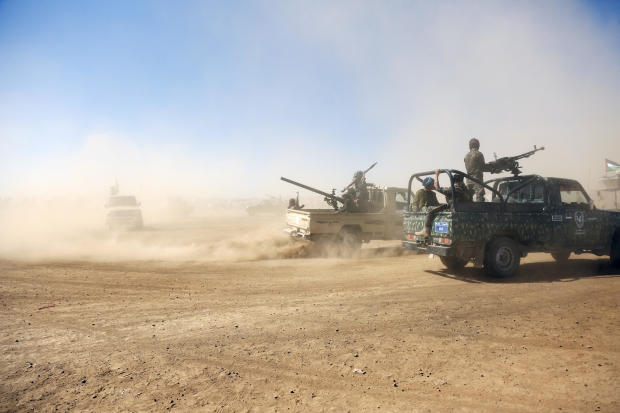Washington — The Biden administration on Wednesday declared Yemen’s Houthi rebels to be a “specially designated global terrorist group,” or SDGT, a move that comes amid the militia’s continuing attacks against commercial vessels in the Red Sea.
The move, announced by the State Department and the White House, reverses part of an earlier decision by the State Department in February 2021 that removed the SDGT designation.
“Today, in response to these continuing threats and attacks, the United States announced the designation of Ansarallah, also known as the Houthis, as a Specially Designated Global Terrorist,” national security adviser Jake Sullivan said in a statement. “This designation is an important tool to impede terrorist funding to the Houthis, further restrict their access to financial markets, and hold them accountable for their actions.”
The State Department’s 2021 decision also removed the group’s designation as a “foreign terrorist organization,” but Wednesday’s action did not reinstate that characterization. Both designations were applied in the final days of the Trump administration to the Iran-backed group, which controls large portions of Yemen and has been engaged in a years-long civil war with the internationally recognized, Saudi-backed Yemeni government.
A State Department official told CBS News in 2021 that the move was “due entirely to the humanitarian consequences of this last-minute designation from the prior administration, which the United Nations and humanitarian organizations have since made clear would accelerate the world’s worst humanitarian crisis.”
The SDGT designation is distinct from an FTO in that it carries different implications for the potential delivery of humanitarian aid. A foreign terrorist organization label can trigger sanctions for those who provide “material support” to a designated group.
In a call with reporters, a senior administration official said the SDGT designation “provides better flexibility to achieve the aims that we have,” namely “safeguarding humanitarian assistance as well as the broader well-being of the people of Yemen” while still countering the Houthis’ “unacceptable terrorism.”

Getty Images
Since the Palestinian militant group Hamas attacked Israel on Oct. 7, killing at least 1,200 people and sparking the Israel-Hamas war, Houthi rebels have launched dozens of drone and missile attacks on merchant ships in the Red Sea in what they have said is an effort to support Palestinians.
When asked by reporters on Jan. 12 whether the Houthis were a terrorist group, President Biden responded, “I think they are.”
Mr. Biden’s comments came on the same day that U.S. and U.K. forces, with support from Bahrain, Australia, Canada and the Netherlands, launched their first round of airstrikes on dozens of Houthi sites in Yemen. American officials, including Secretary of State Antony Blinken, have warned for weeks of unspecified “consequences” for the rebels, while stressing the need to prevent the Gaza conflict from broadening across the Middle East.
On Monday, the Houthis continued their attacks by firing a ballistic missile at a U.S.-owned and operated container ship. There were no serious injuries or damage.
American officials said on Tuesday that the U.S. conducted pre-emptive strikes to destroy anti-ship ballistic missiles that were prepared to launch from Houthi-controlled territory in Yemen. The militia later struck a merchant vessel, causing damage but no injuries.
“We fully anticipated, when we launched that salvo on Friday night, that the Houthis would probably conduct some retaliatory strikes,” Kirby told reporters on Tuesday, referring to the Jan. 12 operation. “We believe that we did have a good effect with those strikes in terms of disrupting and degrading their capability to conduct military offensive operations.”
The attacks have forced some ocean carriers to avoid the Red Sea entirely, leading to worldwide shipping disruptions.
The White House has repeatedly accused Iran of being involved in the Houthis’ Red Sea attacks, allegations Tehran has denied.
However, the Pentagon on Tuesday reported that, over the weekend, it seized a boatload of “advanced conventional weapons” sent from Iran to the Houthis.
U.S. Central Command’s Gen. Michael Erik Kurilla called it evidence that “Iran continues shipment of advanced lethal aid to the Houthis.”
Eleanor Watson, Haley Ott and Tucker Reals contributed to this report.
- In:
- Iran
- Houthi Movement
